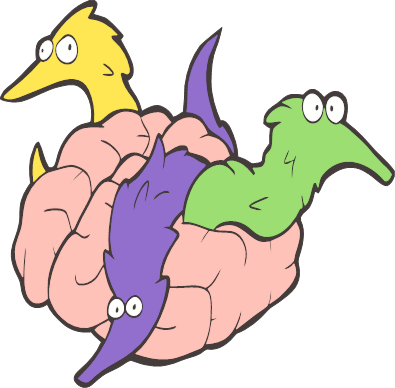The neurosurgeon, Dr Hari Priya Bandi, had pulled an 8cm-long parasitic roundworm from her patient, prompting her to call on Senanayake and other hospital colleagues for advice about what to do next.
The patient, a 64-year-old woman from south-eastern New South Wales, was first admitted to her local hospital in late January 2021 after suffering three weeks of abdominal pain and diarrhoea, followed by a constant dry cough, fever and night sweats.
The surprising discovery prompted a team at the hospital to quickly come together to uncover what kind of roundworm it was and, most importantly, decide on any further treatment the patient might require.
The Canberra hospital patient marks the world-first case of the parasite being found in humans.
“You don’t want to be the first patient in the world with a roundworm found in pythons and we really take our hats off to her. She’s been wonderful.”
"Of the emerging infections globally, about 75% are zoonotic, meaning there has been transmission from the animal world to the human world. This includes coronaviruses.“This Ophidascaris infection does not transmit between people, so this patient’s case won’t cause a pandemic like Covid-19 or Ebola.”
Infectious diseases physician Prof Peter Collignon, who was not involved in the patient’s case, said some cases of zoonotic diseases may never be diagnosed if they are rare and physicians don’t know what to look for.

Bro 💀
First time I’ve ever laughed at that emoji
“so how was your day?”
deleted by creator
I, for one, welcome our new Goa’uld overlords
Hey, could be Tok’ra.
““Canberra is a small place, so we sent the worm, which was still alive, straight to the laboratory of a CSIRO scientist who is very experienced with parasites,” Senanayake said. “He just looked at it and said, ‘Oh my goodness, this is Ophidascaris robertsi’.””
Lmao at him instantly knowing it on sight. We love our parasite nerds.
This is it, this is how the zombie outbreak starts
This is the best summary I could come up with:
It was a fairly regular day on the ward for Canberra hospital infectious diseases physician Dr Sanjaya Senanayake, until a neurosurgeon colleague called him and said: “Oh my God, you wouldn’t believe what I just found in this lady’s brain – and it’s alive and wriggling.”
The neurosurgeon, Dr Hari Priya Bandi, had pulled an 8cm-long parasitic roundworm from her patient, prompting her to call on Senanayake and other hospital colleagues for advice about what to do next.
The patient, a 64-year-old woman from south-eastern New South Wales, was first admitted to her local hospital in late January 2021 after suffering three weeks of abdominal pain and diarrhoea, followed by a constant dry cough, fever and night sweats.
The surprising discovery prompted a team at the hospital to quickly come together to uncover what kind of roundworm it was and, most importantly, decide on any further treatment the patient might require.
“Canberra is a small place, so we sent the worm, which was still alive, straight to the laboratory of a CSIRO scientist who is very experienced with parasites,” Senanayake said.
The patient is recovering well and is still being regularly monitored, Senanayake said, and researchers are exploring whether a preexisting medical condition that caused her to be immunocompromised could have led to the larvae taking hold.
The original article contains 783 words, the summary contains 217 words. Saved 72%. I’m a bot and I’m open source!






